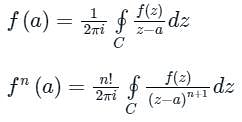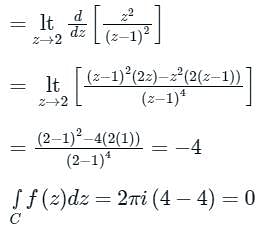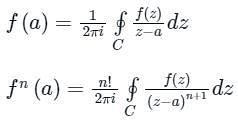Civil Engineering (CE) Exam > Civil Engineering (CE) Tests > Engineering Mathematics > Test: Residue Theorem - 1 - Civil Engineering (CE) MCQ
Test: Residue Theorem - 1 - Civil Engineering (CE) MCQ
Test Description
10 Questions MCQ Test Engineering Mathematics - Test: Residue Theorem - 1
Test: Residue Theorem - 1 for Civil Engineering (CE) 2024 is part of Engineering Mathematics preparation. The Test: Residue Theorem - 1 questions and answers have been
prepared according to the Civil Engineering (CE) exam syllabus.The Test: Residue Theorem - 1 MCQs are made for Civil Engineering (CE) 2024 Exam. Find important
definitions, questions, notes, meanings, examples, exercises, MCQs and online tests for Test: Residue Theorem - 1 below.
Solutions of Test: Residue Theorem - 1 questions in English are available as part of our Engineering Mathematics for Civil Engineering (CE) & Test: Residue Theorem - 1 solutions in
Hindi for Engineering Mathematics course. Download more important topics, notes, lectures and mock
test series for Civil Engineering (CE) Exam by signing up for free. Attempt Test: Residue Theorem - 1 | 10 questions in 30 minutes | Mock test for Civil Engineering (CE) preparation | Free important questions MCQ to study Engineering Mathematics for Civil Engineering (CE) Exam | Download free PDF with solutions
*Answer can only contain numeric values
Test: Residue Theorem - 1 - Question 1
The value of the integral  where z is a complex number and C is a unit circle with centre at 1 + 0j in the complex plane is __________ .
where z is a complex number and C is a unit circle with centre at 1 + 0j in the complex plane is __________ .
 where z is a complex number and C is a unit circle with centre at 1 + 0j in the complex plane is __________ .
where z is a complex number and C is a unit circle with centre at 1 + 0j in the complex plane is __________ .
Detailed Solution for Test: Residue Theorem - 1 - Question 1
Test: Residue Theorem - 1 - Question 2
The value of ∮1/z2 dz, where the contour is the unit circle traversed clockwise, is
Detailed Solution for Test: Residue Theorem - 1 - Question 2
| 1 Crore+ students have signed up on EduRev. Have you? Download the App |
Test: Residue Theorem - 1 - Question 3
Let z = x + iy be a complex variable. Consider that contour integration is performed along the unit circle in anticlockwise direction. Which one of the following statements is Not True?
Detailed Solution for Test: Residue Theorem - 1 - Question 3
Detailed Solution for Test: Residue Theorem - 1 - Question 4
Test: Residue Theorem - 1 - Question 5
If f(z) has a pole of order n at z = a, then residue of function f(z) at a is
Detailed Solution for Test: Residue Theorem - 1 - Question 5
Detailed Solution for Test: Residue Theorem - 1 - Question 6
Test: Residue Theorem - 1 - Question 7
The residues of a complex function X (z) =  at its poles are
at its poles are
Detailed Solution for Test: Residue Theorem - 1 - Question 7
Test: Residue Theorem - 1 - Question 8
Integration of the complex function f (z) =  in the counterclockwise direction, around |z – 1| = 1, is
in the counterclockwise direction, around |z – 1| = 1, is
Detailed Solution for Test: Residue Theorem - 1 - Question 8
Detailed Solution for Test: Residue Theorem - 1 - Question 9
Detailed Solution for Test: Residue Theorem - 1 - Question 10
|
65 videos|120 docs|94 tests
|
Information about Test: Residue Theorem - 1 Page
In this test you can find the Exam questions for Test: Residue Theorem - 1 solved & explained in the simplest way possible.
Besides giving Questions and answers for Test: Residue Theorem - 1, EduRev gives you an ample number of Online tests for practice
|
65 videos|120 docs|94 tests
|
Download as PDF



 f(z)dz = 2πi [sum of residues]
f(z)dz = 2πi [sum of residues]






 = x − iy i.e.u = x and v = − y
= x − iy i.e.u = x and v = − y is not Analytic Analytic
is not Analytic Analytic are:
are:





 f(z) dz = 2πi × [sum of residues at the singualr points with in C]
f(z) dz = 2πi × [sum of residues at the singualr points with in C]



 then ∮ f (z) dz is
then ∮ f (z) dz is
 = 2πi [sum of residues at z = 1 and z = 2]
= 2πi [sum of residues at z = 1 and z = 2]


 f(z)dz = 2πi × [sum of residues at the singualr points with in C]
f(z)dz = 2πi × [sum of residues at the singualr points with in C]








 = 2πi × [sum of residues at the singualr points with in C]
= 2πi × [sum of residues at the singualr points with in C]




 is
is



 at z = 2 is
at z = 2 is
















